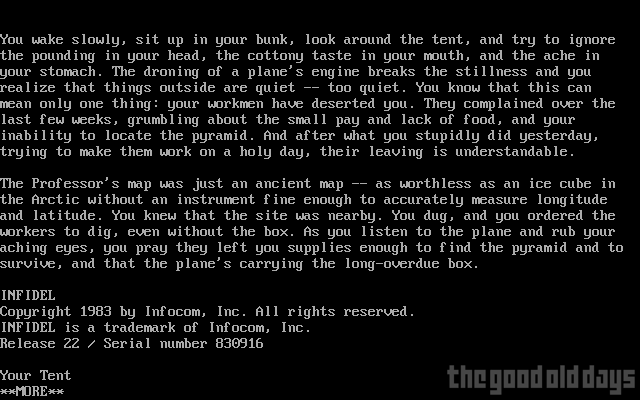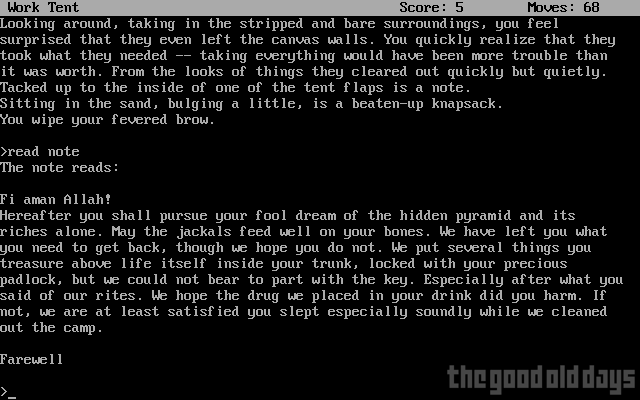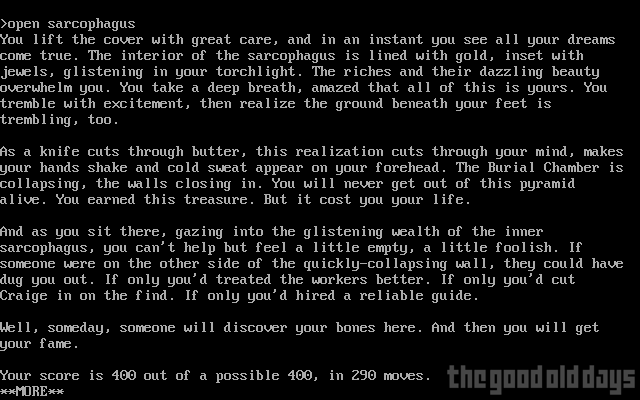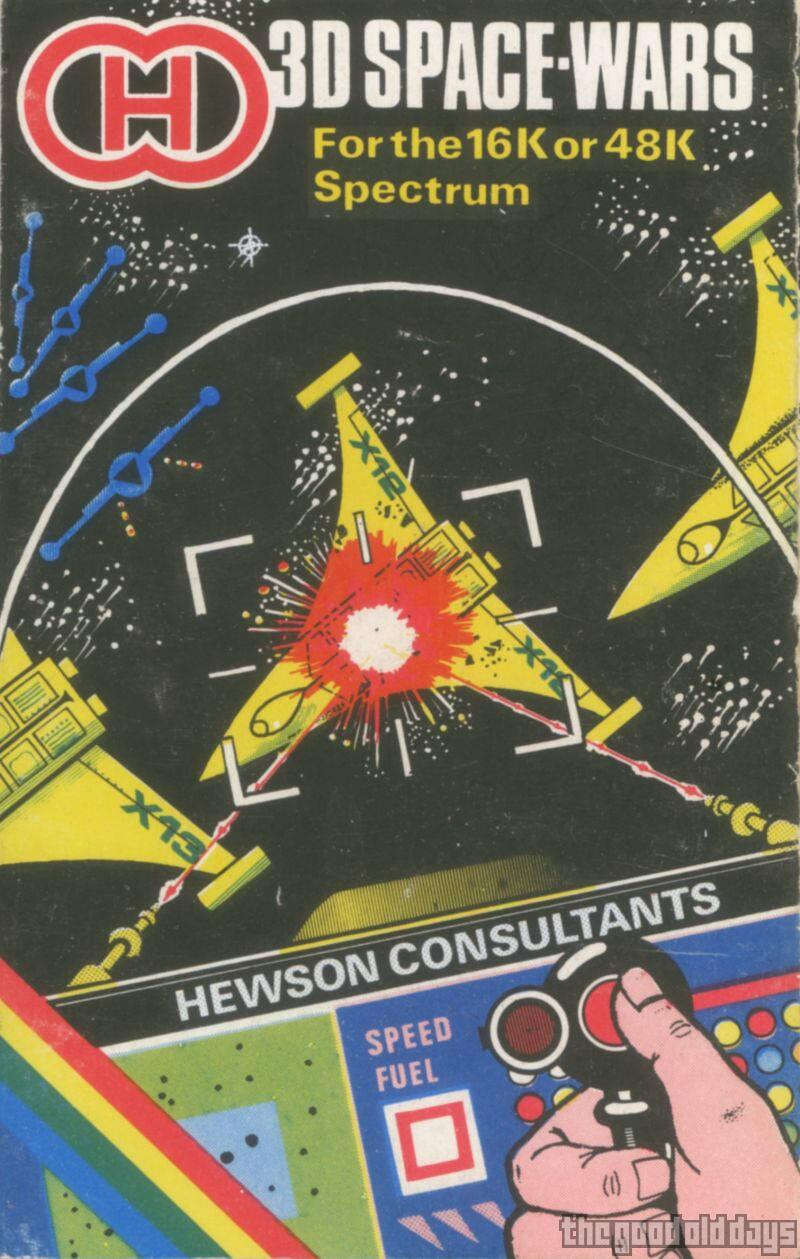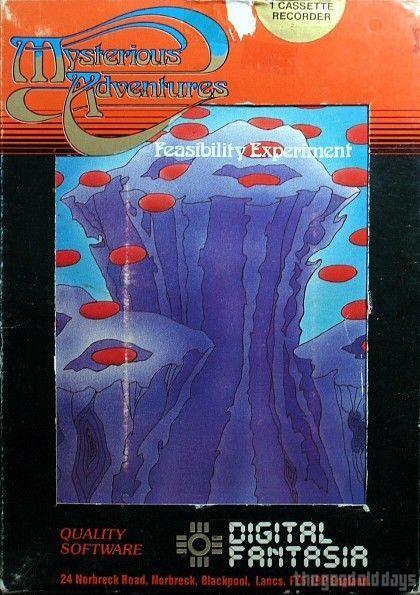Opinion Back Then
I found Infidel great fun to play, for this adventure into Egypt had a sense of humour that appealed to me. I must point out, however, that if you are an Adventurer who thrives on very difficult puzzles, then this might not be for you […] But what really made me sit up and pay attention whilst playing this Adventure in the sun didn’t come until the very end […] I was at any moment expecting to get a “Congratulations, you’ve won” message, when what actually appeared was so unexpected that I just had to play Infidel all over again to make sure it said what I thought it said. It did. […] it must surely be one of the most original Adventure endings to date, if not of all time.
Paul Coppins, Computer + Video Games #37
Thoughts by Mr Creosote (01 00 2013) – PC (DOS)

Adventuring started in the caves… the common themes of almost all early adventure games, whether they took place in the murky depth of a cave or even outside was that they were treasure hunts: The player’s task was always to find special treasure items and collect or often also retrieve them to a safe place. Puzzles usually centered around physical manipulations of a relatively lifeless environment, mostly to open blocked doorways and avoid traps. As for settings, simple sword & sorcery fantasy worlds dominated the picture. Infidel, set in the contemporary 1980 of our own world, marks an interesting transition from those basic roots towards more thoughtful undertones.
Unlike the common faceless protagonist of previous games, Infidel’s player takes over the role of a fairly well-defined adventurer character on an expedition to find a ‘lost’ pyramid in Egypt. Things go wrong when his positioning equipment breaks and to bridge the time until a replacement arrives, he starts pushing his hired workers harder and harder… until they abandon the camp, leaving him behind in the desert all alone. Still bound to find the pyramid and its treasures, he vows to succeed all on his own out of pure defiance.
Here, the actual game begins: With minimum supplies, but at least a rough map, the player has to locate the entrance to the pyramid before dying of thirst in the endless desert. Once inside, a classic set of deadly traps guarding wealth beyond imagination awaits him. Avoiding these traps requires careful examination of the surroundings as well as deciphering a specially created set of ASCII-based hieroglyphs which provide in-game hints.
This classic treasure hunting part is excellently executed, but it does not stray far from well-trodden Zork territory. Until (thirty years after publication, I guess there is not much of a danger of spoiling things for anybody) the bittersweet ending which makes a painful lot of sense, because it ties in with the initial setup perfectly: Finding the ultimate treasure in the inner sanctum of the pyramid, the protagonist is buried beneath the collapsing walls of the chamber. With nobody left to help him or to even just look for him, he dies a horrible and unavoidable death.
That ending can be read as a reflection on the genre as a whole: The arrogance of the lone adventurer as prevalent in genre, the self-indulgent overestimation of his own capabilities finally catches up with him and he has to pay. Infidel’s backstory told us how this particular protagonist had already broken ties with his partner, because he wanted fame and fortune all for himself. How he had mistreated his workers. Then, his foolish decision to seek out the treasures of the pyramid all on his own. In the course of the game, there are plenty of hints at his megalomania as well; successfully solving major puzzles is often accompanied by stingy rants about the ‘idiots’ he left behind. Yet, the player becomes an accomplice in this madness willingly, because the lure of the fun game (representing the lure of wealth, fame and fortune) is too strong.
Many articles about the game and even walkthroughs end with the recommendation to grab as many treasures as possible (to get almost the full number of points), then escape the pyramid alive and simply quit the game. Quite frankly, though, I think these people are missing the point. They recommend playing the game as if it did not have these undertones; at what point in time in the pyramid you die shouldn’t matter – the point is that the whole expedition as it was conducted was a stupid idea in the first place! I’d even go as far as saying there are only two ways in which it makes sense to enjoy the game: Either you play it to the very end as it was intended or you recognise the futility of it all and don’t play it at all (i.e. you abandon the excavation when the workers abandon you).
